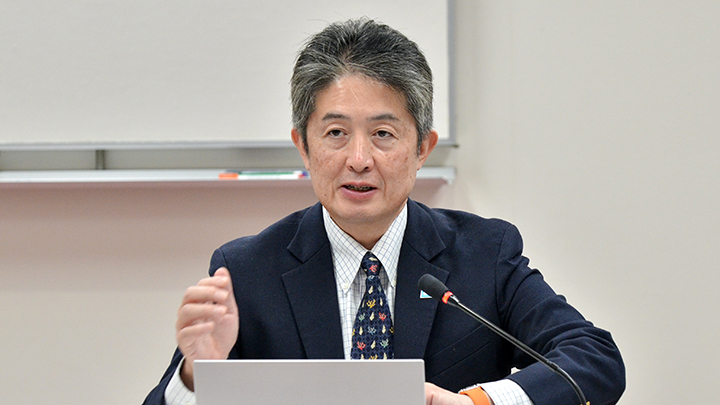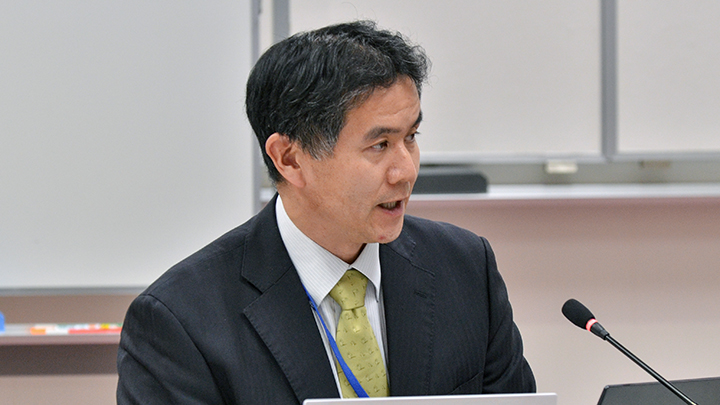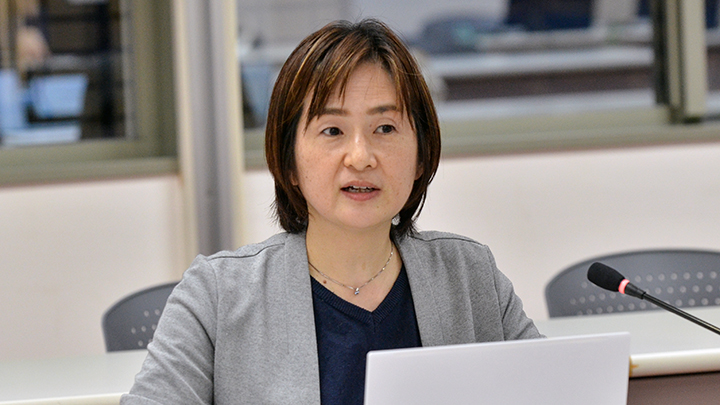Knowledge Forum: Water Resource Strategies for Achieving Food Security Under Changing Climate
2025.03.21
On Dec. 6, 2024, the JICA Ogata Sadako Research Institute for Peace and Development (JICA Ogata Research Institute) held the Knowledge Forum “Water Resource Strategies for Achieving Food Security Under Changing Climate.” As the global population and demand for food are expected to increase in the coming few decades, water resource strategies and development cooperation in the face of the impacts of climate change were discussed.
Following some opening remarks by Miyahara Chie
, Director General, JICA Ogata Research Institute, Professor Oki Taikan
from the University of Tokyo (also a Distinguished Fellow at the JICA Ogata Research Institute) gave a lecture. Oki is a world-renowned researcher in hydrology.

Professor Oki Taikan, University of Tokyo (also a Distinguished Fellow at the JICA Ogata Research Institute), gives a lecture.
Why does water shortage occur when water is a resource that circulates within the Earth system? Oki started by asking this question to the audience. He then shared some key characteristics of water. First, its distribution is uneven and depends on the geographical region and season, and second, there is limited economic rationality for shipping water from one area to another because water is cheap and required in large quantities. The concept of virtual water was then explained: when countries import food, it is virtually equivalent to importing the water that was used to produce the imported food. It is said that as much as 1,000 t of water is required to produce 1 kg of wheat. Thus, many countries compensate for their shortage of water through global food trade. Oki shared data to show that major exporters of virtual water are primarily agricultural powerhouses such as Uruguay, Canada, Australia and the United States, while major importers are primarily Middle Eastern countries that have limited water resources but are not under much fiscal pressure, such as Libya, Saudi Arabia, UAE and Kuwait.
Furthermore, to show how the current situation of our planet may be changed by climate change, Oki presented the results of simulations based on various scenarios such as increased frequency of droughts, changes in population distribution, changes in grain yield and occurrence of famines. In the case of famines, for instance, although one may assume that a country with a high food self-sufficiency rate seems safer at first, the risk of famines increases if the country lacks the financial resources to import food when the harvest is bad. With statistics, Oki showed that famines would less likely occur in countries that have stronger economic power and rely on a high percentage of imported grain from normal times.
Oki then added that while the world population has more than doubled in 50 years (1961–2011), crop production has increased by 3.5 folds due to innovations during the Green Revolution and beyond even though farmland area has hardly increased. He added his personal view, commenting that humans have already somehow managed to pull through the toughest times, because although population growth may continue, its rate will be slower compared to the past several decades. Oki said that from now on, based on past experience, it is important to increase food supply in parallel with population growth or facilitate the development of developing countries so that they have the capacity to buy food. He concluded that water shortage is a development issue.
A panel discussion between Oki and Shiratori Sakiko, Project Leader, Information and Public Relations Office, Japan International Research Center for Agricultural Sciences (JIRCAS), followed. Sato Ichiro
, Executive Senior Research Fellow, JICA Ogata Research Institute, served as the moderator.

Sato Ichiro, Executive Senior Research Fellow, JICA Ogata Research Institute, moderates the discussion.
Shiratori, a specialist in agricultural economics, started by stating that food and water are inseparable. Not only is the world population growing but the eating habits of consumers are changing, as seen in the shift from plant-based to more animal-based diets. She added that agricultural production can no longer simply aim for increased production. Rather, things like nutritional balance and environmental impacts need to be considered as well, and food issues are becoming more complex. Shiratori then shared her experience of research work on food consumption behaviors in Africa. She also shared that traditional crops such as sorghum and millets are in the spotlight again, since they require less water for cultivation compared to common grains like rice. Shiratori talked about the use of smart agricultural technologies as well, for example, monitoring water level with sensors to efficiently use water resources.

Shiratori Sakiko, Project Leader, Information and Public Relations Office, JIRCAS, in the panel discussion
In the Q&A session, questions were taken from the floor. To a question about areas that should be prioritized when providing assistance for food security in countries that lack water resources and are struggling to raise income levels, Oki responded that assistance should not be limited to water and food. He re-emphasized the importance of comprehensive development, explaining that the overall capacity of society needs to be raised by providing assistance to areas like education, healthcare and infrastructure, and as a result of this, water management and food production will become more appropriate.
Active discussion followed, covering various topics including the advancement of water-related technologies like seawater desalination, grain-yield forecasting, changes around exporting countries of virtual water and the introduction of agricultural technologies in developing countries.
For further information on the outcome of research on water resource by the JICA Ogata Research Institute, please visit the following webpage:

事業事前評価表(地球規模課題対応国際科学技術協力(SATREPS)).国際協力機構 地球環境部 . 防災第一チーム. 1.案件名.国 名: フィリピン共和国.

事業事前評価表(地球規模課題対応国際科学技術協力(SATREPS)).国際協力機構 地球環境部 . 防災第一チーム. 1.案件名.国 名: フィリピン共和国.

事業事前評価表(地球規模課題対応国際科学技術協力(SATREPS)).国際協力機構 地球環境部 . 防災第一チーム. 1.案件名.国 名: フィリピン共和国.

事業事前評価表(地球規模課題対応国際科学技術協力(SATREPS)).国際協力機構 地球環境部 . 防災第一チーム. 1.案件名.国 名: フィリピン共和国.

事業事前評価表(地球規模課題対応国際科学技術協力(SATREPS)).国際協力機構 地球環境部 . 防災第一チーム. 1.案件名.国 名: フィリピン共和国.